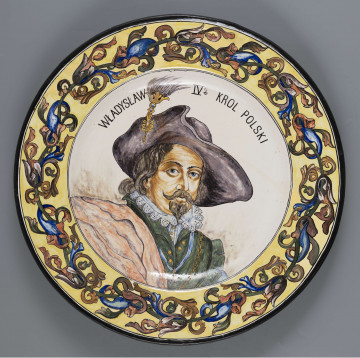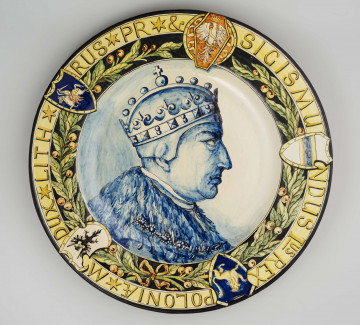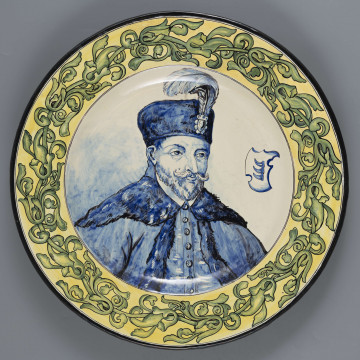
Platter with a bust of Władysław IV
1882 — 1885
National Museum in Lublin
Part of the collection: Majolica from Nieborów
The word maiolica comes from the name of the island of Majorca, where Spanish ceramics intended for export to Italy were stored. In Poland, maiolica started to be produced around 1880 in the factory in Ćmielów under Stanisław Thiele. The time of his activity in Ćmielów was a short episode. A passionate enthusiast of his trade, he devoted his professional life to the factory in Nieborów, which he continued even when its founder, Prince Radziwiłł, withdrew from the project. Although the technology of producing majolica was previously unknown in Poland, these products had been arriving here from Western Europe since the 16th century.
The faience known as majolica had tops covered with a thick layer of opaque tin-lead glaze painted in patterns with ceramic paints based on metal oxides. Such prepared vessels were fired at temperatures of up to 1000-1100 °C. The colours then acquired intense shades.
The colourful jardiniere with the representation of the Sobieski family and the view of the Wilanów palace is one of the most impressive artistic achievements of the manufactory in Nieborów. A plastic ornament of expressive colour emphasises the sketch-painted landscape and figural representations. Thanks to Thiele, who used to work in France, the form of vessel refers directly to the solutions of the Nevers workshop. The decoration was inspired by the original painting spread by means of graphics. Painters working in Nieborów often used graphic patterns. This was the case with Helena Rogowska, a painter associated with the manufactory in 1880-1885, the author of the painting of the jardiniere. She created a sophisticated composition with careful drawing on a vessel of impressive size.
She designed a group portrait showing Sobieski with his family, based on a woodcut by Julian Schubeler, which appeared in Tygodnik Ilustrowany in 1883. It was a graphic repetition of the composition of a painting by Henri Gascar from 1691. The jardiniere of beautiful form is a top-class example of the historicising trend in Polish ceramics.
Magdalena Norkowska
Author / creator
Dimensions
cały obiekt: height: 57 cm, width: 33 cm
Object type
dish
Technique
ceramic technique
Material
faience
Creation time / dating
Creation / finding place
Owner
The National Museum in Lublin
Identification number
Location / status

1882 — 1885
National Museum in Lublin

1882 — 1885
National Museum in Lublin

1882 — 1885
National Museum in Lublin
DISCOVER this TOPIC
Castle Museum in Łańcut
DISCOVER this PATH
Educational path